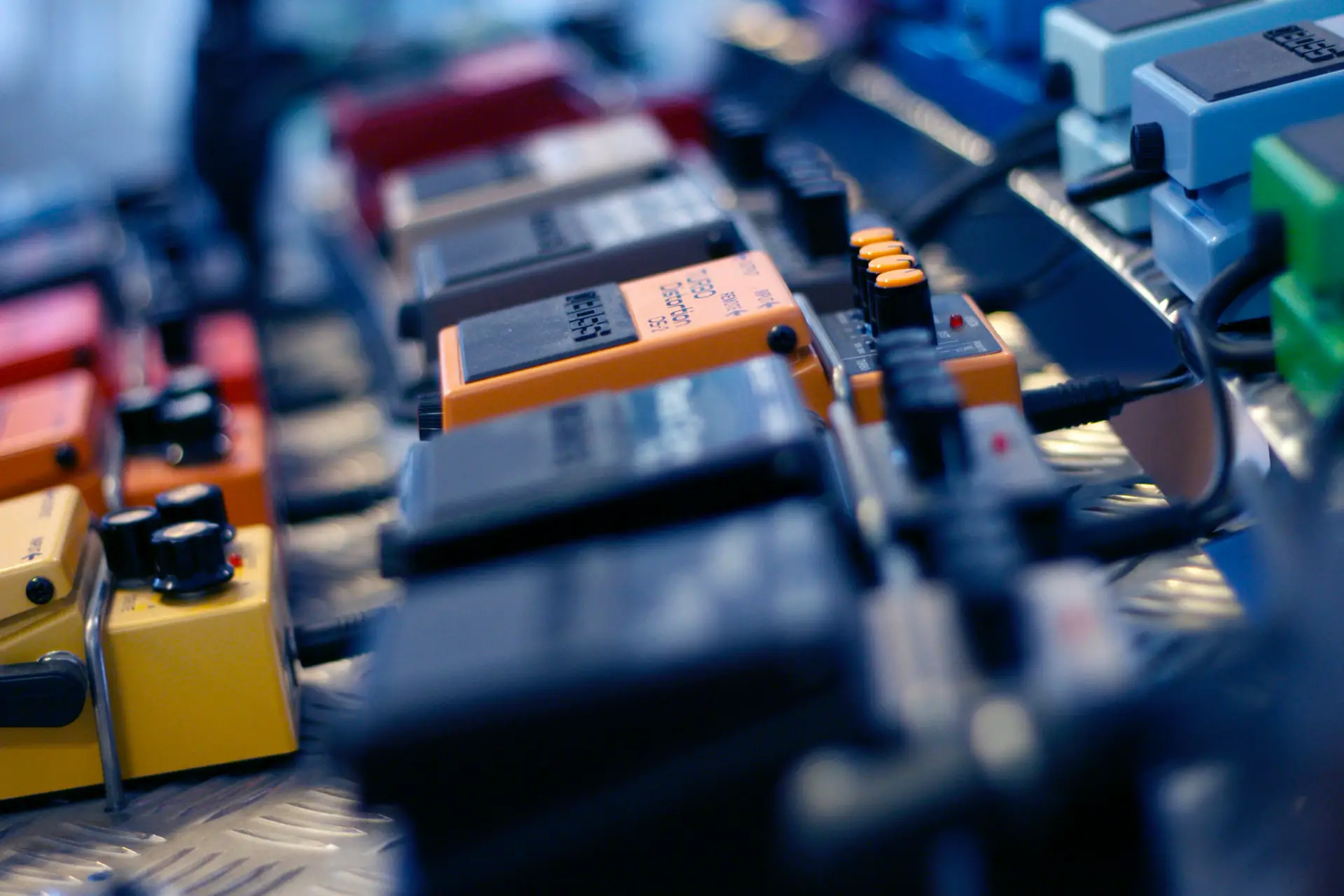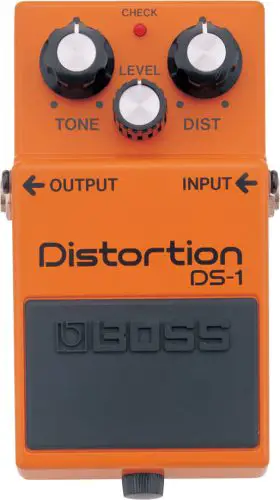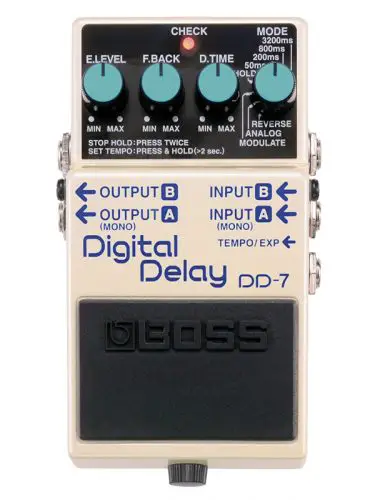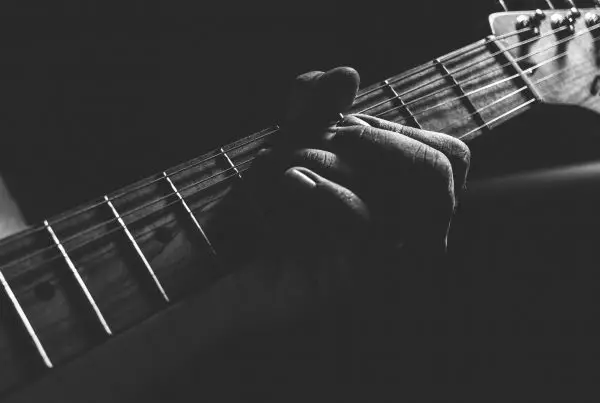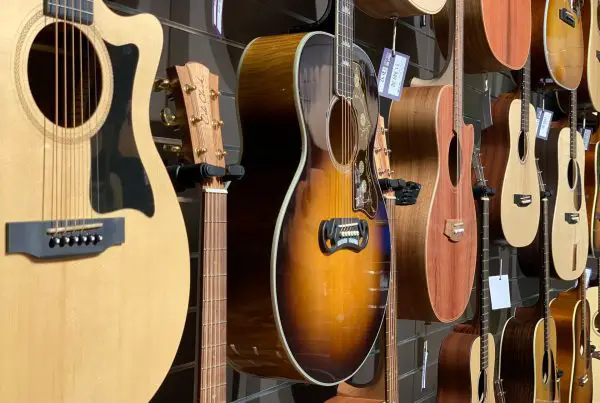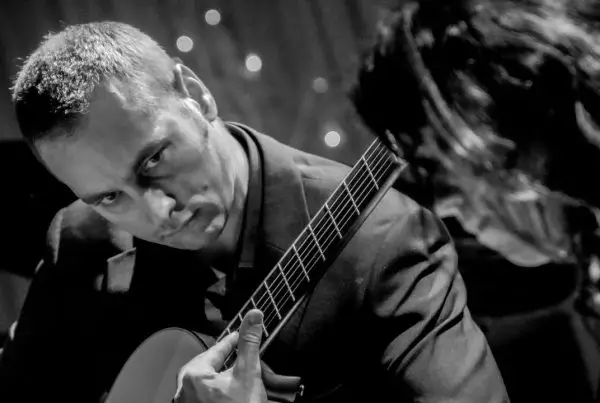Pedals, except tuner pedals, are not technically important for beginners because they have to learn to play clean first to create the right habits. But, there is nothing bad about beginners using pedals.
There are a lot of benefits when it comes to using pedals. Beginners can ease their playing and make it more interesting. But, at the same time, using pedals constantly can lead to bad habits, and you don’t want that.
My teacher always says that you need to strike a balance between music theory and playing songs, but it’s sometimes good to play more in order to create more motivation for future learning.
In this article, you will find everything about beginners using pedals and some tips when it comes to buying the very first gadget that will fit your pedalboard. The article includes:
- Are Guitar Pedals Necessary For Beginners?
- Do Guitarists Still Use Pedals?
- What Pedals Should A Beginner Guitarist Have?
- What Is The Most Important Guitar Pedal?
- How Can I Get Guitar Effects Without A Pedal?
- Conclusion
Are Guitar Pedals Necessary For Beginners?
Guitar pedals are not necessary for beginners. It’s important to first learn the basics of guitars like chords, finger techniques and amp EQ settings before purchasing pedals.
For a beginner, the most important thing is to focus on the fundamentals first. He/she needs to build strength and flexibility in his/her hands and fingers to avoid pain and stiffness in the hands, back, and wrists. Also, beginners have to learn to play chords and fret notes clearly.
Entry-level players have to make sure they are actually learning how to play on guitar – not just learning how to play a few songs and change between pedal effects.
It is understandable that beginners can’t wait to jump to songs and distortion because music theory can be boring and kill the whole motivation the beginner used to have. But, the point is everyone needs to strike a balance between learning music theory and playing songs.
You won’t be a good guitarist if you spend most of the time memorizing theory, and you won’t be a good guitarist if you just focus on playing songs and pedal effects.
It can be said that pedals can be both good and bad for beginners, and the fact that there is a bad side makes them unnecessary. You can try them out, but you can accomplish everything without them once you become a stunning player.
Pros & Cons Of Guitar Pedals (For Beginners)
Pros
- Using a tuner pedal saves time and helps the beginner tune the guitar correctly. Beginners are not expected to have a trained ear to tune guitars and the tuner pedal can help beginners achieve correct tuning easily.
- Easily create effects with existing amp. With pedals, beginners don’t have to worry about the specific techniques to create a sound effect. Just plug into a pedal and you are ready to go.
- Pedals can boost motivation. Pedals can keep beginner guitarists excited because of the different effects and songs they can now learn to play. Motivation is important to continue learning.
Cons
- Pedal effects hide mistakes. With pedal effects, the sound becomes dirtier and your mistakes are hidden. This usually leads to bad habits – which is why I suggest beginners to not rush and use guitar pedals.
- Pedals make guitarists lazy. With pedals, a guitarist can easily achieve sound effects without learning new techniques and developing their skills.
- Pedals reduce chances for training. Guitarists that use pedals will not be forced to learn new skills – especially skills that take a long time to master like ear training to stop tones and tuning.
All these reasons make the pedals unnecessary for beginners, but they are welcome from time to time.
My advice is that once you learn fundamentals, you are ready to try playing with pedals and explore everything about them. But, it’s better to be focused on developing skills and creating guitar effects by playing technique, in my opinion.
Do Guitarists Still Use Pedals?
Guitarists still use pedals because they have a lot of benefits, from controlling the sound, creating effects, to making guitarists sound like a pro.
Everyone wants to sound perfect and to enrich their playing with some effects. Pedals add some extra power to chords which makes the sound way better.
There are a lot of reasons why guitarists still use pedals, and every guitarist confirms that pedals offer various benefits that are going to be explained in detail.
1. Pedal is Practical And Easy To Use
Pedals don’t require significant knowledge – all you need is to plug them in and play. Also, they are small enough to fit into a backpack or even a pocket. That’s one of the reasons why guitarists still choose pedals over amps because amps can be pretty hard to carry around.
2. Pedal Provides Guitar Effects
Guitar pedals provide different guitar effects. They can change the dynamics and the character of the guitar’s sound.
For example, distortion adds warmth to the guitar sound, and delays produce a delightful echo effect.
3. Faster Tuning
Having a tuner pedal makes everyone happy – there is no need for taking any effort when it comes to re-tuning. This gadget works for you and even detects some technical issues if present.
Pedals help the guitarist to create and be unique. They make his/her wishes come true and convert the idea into sound.
If you want to make your acoustic guitar sound more beautiful, check this article for some tips – Using Effects Pedal On Acoustic Guitar (& 6 Best Effects).
What Pedals Should A Beginner Guitarist Have?
A beginner guitarist should have a tuner pedal first, and in case of wanting to explore more after learning fundamentals, a beginner should have some essentials, such as overdrive, distortion, delay, and chorus pedal.
Once the guitarist meets all guitar-playing fundamentals, he/she is ready for the next step – experimenting and exploring. That helps the beginner stay motivated and ready for learning new skills.
Before you start using some crazy effects, make sure you’ve provided a nice tone foundation. Therefore, you’ll need some pedals – a tuner, overdrive, distortion, delay, and chorus pedal.
These are the most common pedals that beginners should look into.
1. Tuner Pedal
A tuner pedal doesn’t make any sound, but it helps you to sound way better because it will keep your guitar in tune.
Playing in tune is one of the most important things that lead to beginner development in playing.
If you keep playing out-of-tune, your ears will accept that non-accurate sound as normal. And that’s such a bad thing if it happens to you.
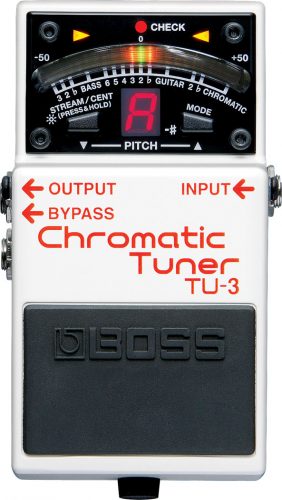
2. Overdrive Pedal
An overdrive pedal gives a grit to the guitar sound and beautifies it. It is easier for a beginner to boost the drive on an overdrive pedal than reduce the drive on a distortion pedal, so an overdrive pedal is the better choice for beginners.
You can find a lot of good overdrive pedals under $100 and you don’t need expensive ones for the start. I personally use Boss SD-1 Overdrive pedal and it has been great for me. You could check it out.
Keep in mind you’re just experimenting and focusing to learn more complex guitar-playing techniques.
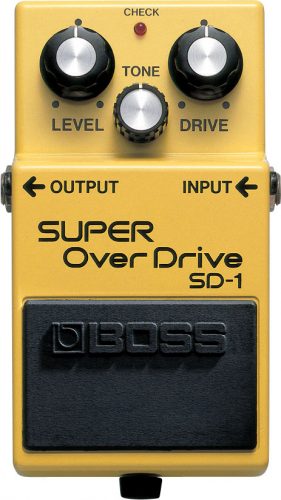
3. Distortion Pedal
Distortion pedal gives a saturated, soaring lead sound. Rock music would disappear if there were no distortion pedals.
You don’t need a monster amp for reaching the grinding sound – buy this pedal and enjoy.
4. Delay Pedal
A delay pedal creates an echo-like effect and ambient textures. The opening part of the Guns N’ Roses’ song called Welcome To The Jungle is a good example of using delay pedals.
You don’t need a wild pedal – you just need it for your room and practice. As a beginner, you don’t have live performances on big stages.
5. Chorus Pedal
Chorus pedal simulates the sound of multiple musical instruments playing the same part, and it’s like singing with a chorus group.
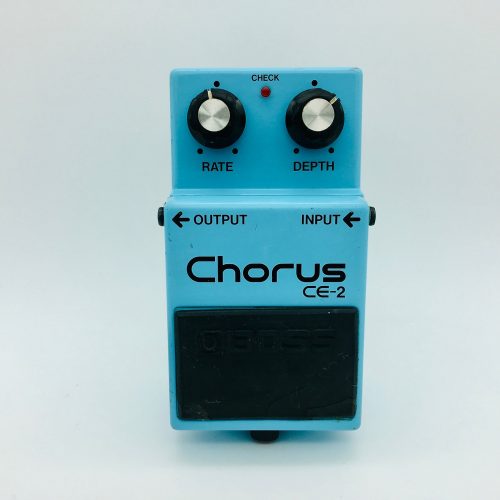
What Is The Most Important Guitar Pedal For Beginners?
The most important guitar pedal for beginners is a guitar tuner pedal that makes the player never be out of tune.
As I said before, constantly being out-of-tune makes your ears trained to that inaccurate sound. That creates such a bad habit and problem for you as a guitarist and a future professional.
You can’t compare a handheld tuner or the one from the app store with a tuner pedal. It is more accurate, and you won’t ever sound terrible.
And if you have a live performance, whether as a beginner or more advanced player, you won’t have to turn around, turn the amp off to tune your guitar.
You only need somewhere between $100 and $120 for a good pedal amp. Don’t buy expensive pedals because it’s needles, and don’t buy cheap guitar pedals – they may not be accurate.
I personally use BOSS pedals and they have been my go-t0 for years now. I have linked to many BOSS pedals throughout this article. Check them out.
Other types of pedals are not necessary when compared to guitar tuner pedals. But once a beginner learns the basics, it’s time for him/her to provide a nice tone foundation.
How Can I Get Guitar Effects Without A Pedal?
You can get guitar effects without pedals by a decent guitar, amp, and particular playing techniques.
Pedals are not a must-have when it comes to creating guitar effects. You can create any of those effects with your knowledge and minimum of gear.
You need to search for the right guitar because different guitar means different sound. The same is for amps.
You can create guitar effects by learning some playing techniques. For example, if you want a vibrato, rock your fretting hand back and forth, and push and pull on the neck.
For more tips and tricks on how to get guitar effects without a pedal, check this article – Distortion Without Pedal: Alternative Ways To Play Effects.
Conclusion
The most important pedal for beginners is a guitar tuner pedal because beginners have to sound accurate from the very start. Ears need to be trained to an accurate sound, and that’s how beginners create good habits for their future.
Pedals are really nice to have, but they are not essential. Getting a pedal of some of them can help you take your whole playing to the next level and feel more motivated because the rock song you’ve just performed sounds great with a distortion the pedal gives.
Therefore, as a beginner, all you need is a guitar, an amp, and some skills in your fingers, but there is nothing bad in using pedals sometimes. But once you become available to play live on big stages, pedals will become an everyday gear.


